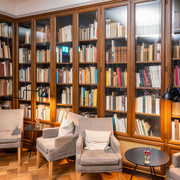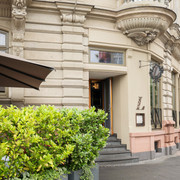The cajón as an instrument originated in Peru in the 17th century. Slaves, who were forbidden by the church to use drums, which were considered “pagan,” for their music, began using wooden boxes (Spanish ‘caja’ or “cajón”), which were actually used to transport goods, to mark the rhythm of their music.
On a tour in 1977, the famous flamenco guitarist Paco de Lucía discovered the instrument in Peru and recognized its similarity to the sound of taconeo, the noise made by flamenco dancers with their heels on the wooden floor. He introduced the cajón to the world of flamenco, where it quickly spread and is now also called the “cajón flamenco” because of its importance.
Pepe Zapata developed the cajoneada together with musician and percussionist Guillermo García “El Guile.” In their workshop, they introduce the audience at Spanien am Main to the basic flamenco rhythms.
Dates
Saturday, the 30.08.2025
13:15 - 13:45 o'clock
Saturday, the 30.08.2025
17:30 - 18:00 o'clock
Sunday, the 31.08.2025
13:00 - 13:30 o'clock
Good to know
Payment methods
Author
Organization
Tourismus+Congress GmbH Frankfurt am Main
Nearby




